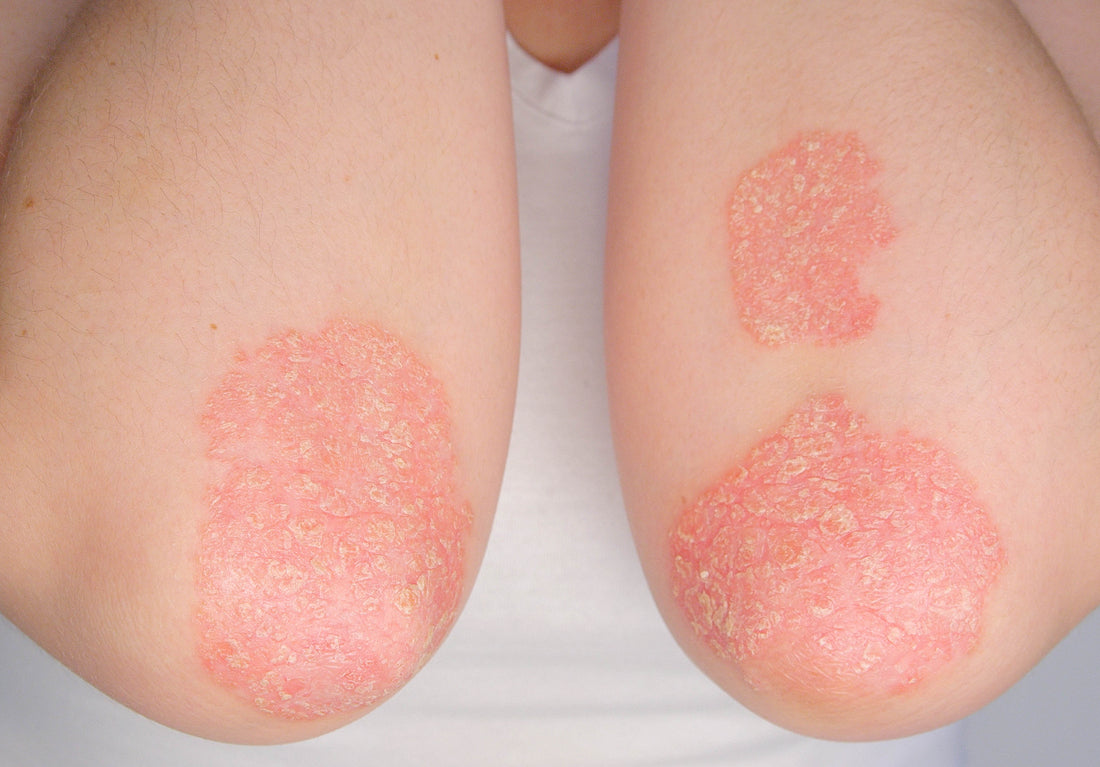
World Psoriasis Day Q&A with Dr. Olga
Today is World Psoriasis Day, an event which has been marked on this day for more than ten years. Psoriasis is a life-long skin condition and despite its prevalence among the Irish population, it remains relatively taboo still. In recent years, awareness has grown through ventures such as World Psoriasis Day which seeks to educate and raise the profile of this disease, which has not only a physical effect on sufferers, but a psychological one, too. This is why it’s so important to get talking about it!
We’ve been chatting to Dr. Olga O’Driscoll, our resident nerdie MD about just what exactly psoriasis is, and how to go about managing it.

Q: So, Dr. Olga - what exactly is psoriasis?
A: Psoriasis is a chronic inflammatory skin condition. It is estimated to affect approximately 2% of the Irish population, and more than 100 million people worldwide. Psoriasis makes no difference between hoomans - men and women are equally affected.
In psoriasis, the normal process of skin cell production and maturation speeds up. Immature skin cells are produced rapidly, and move to the surface of the skin before their time. These shed, and appear as the build-up of thick white scales on the skin’s surface.
Psoriasis also means that the skin has increased blood flow, and the epidermis is thicker than usual. This results in the characteristic red, raised plaques on the surface of the skin.
Psoriasis can occur all over the body, or might be localised to one area (like your scalp, for example).
Q: Is psoriasis genetic?
A: We’re not entirely certain what causes psoriasis. Genetics do play a role - around a third of hoomans with psoriasis have family members who are also affected.
Other things come into play, like environmental factors and your immune system. It’s referred to as immune-mediated inflammatory disease. This means that the inflammation is driven by immune system responses, which might in this case be abnormal.
However, environmental factors can trigger the first episode of psoriasis, or contribute to its severity - for example, if you’re suffering from an infection or injury to the skin, are under stress stress, taking certain medications, or even smoking or consuming excessive alcohol.
Q: Is it contagious?
A: Absolutely not! Psoriasis is not contagious, infectious, or related to hygiene. Fact.
Q: How can I treat it?
A: There are lots of different treatments for psoriasis, depending on its severity and what part of the body is affected. Your first port of call should be your GP, as they are in the best position to examine your skin and advise you how best to look after it. Your GP might prescribe treatment, or refer you to a consultant dermatologist depending on your skin needs.

Q: What are the most common medical treatments for psoriasis?
A: There are lots of different treatment options for those suffering from psoriasis. Once you’ve seen your GP, they will prescribe treatments based on the severity and location of your psoriasis. Unfortunately, there is no one-size-fits-all treatment, and very often finding the right one for you might be trial and error. Psoriasis is a challenging condition to treat, but new therapies are being developed all the time! Here are some common types of medical treatments:
Topical treatments
These are applied directly to the skin, such as:
- Emollients - these are moisturisers which soothe dry skin, reduce itch and soften scale.
- Steroid creams - these reduce inflammation and slow down the overproduction of skin cells.
- Calcipotriol (synthetic vitamin D) - helps to regulate skin cell production.
- Tar products - these can decrease accelerated skin cell production.
Phototherapy
A: This is a form of artificial UV light therapy which is delivered in a hospital setting. It may be UVA or UVB based, and treatment length can depend on the individual.
Systemic treatments
These may be prescribed in circumstances where topical therapies or phototherapy have not worked. Systemic treatments target the abnormal immune response and work throughout the whole body. They may take the form of a liquid, tablet, or injection.
Biologic treatments
These are the newest type of medical therapy for psoriasis. They target specific overactive parts of our immune system, to reduce abnormal inflammatory responses, and improve psoriasis. These drugs are given by injections under the skin, or IV infusions in hospital.
As you can see, the treatment options for psoriasis are many and varied. Please don’t hesitate to drop into your GP and discuss which treatment options might be best for you!
Q: Can you ever fully get rid of psoriasis?
A: Psoriasis is not “curable”, but it can be extremely well-controlled with the right treatments and self-care, keeping symptoms to a minimum.
Q: What should I avoid if I have psoriasis?
A: The best way to manage psoriasis is to pursue a healthy lifestyle, and to avoid things that may aggravate your psoriasis. These can include; smoking, excessive alcohol, stress, injuries to the skin (including sunburn), and products that dry out the skin (moisturising products are key).
This year, the theme of World Psoriasis Day is ‘connected’ which we think fits in really well with our Nerd Network community. If you suffer from psoriasis, it’s important to remember that you’re part of a whole skin-centric community, and there’s plenty of advice and support to be given at all times. If psoriasis is something which you’re struggling with, we encourage you to give your Nerd or Nerdette a bell and take advantage of the support they’re dying to offer you. Your Nerd or Nerdette can advise you as best as possible from their knowledge, or refer you to Dr. Olga for medical support with your psoriasis.
